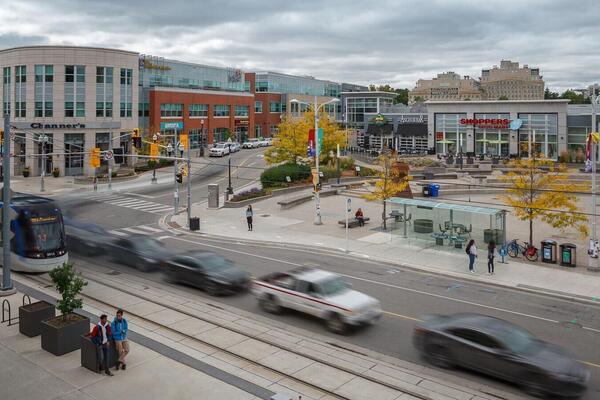
Engineering for change
Waterloo Engineering hosts first IBET conference to boost academic diversity

Waterloo Engineering hosts first IBET conference to boost academic diversity
By Charlotte Danby Faculty of EngineeringWaterloo Engineering proudly hosted the inaugural conference this week for a fellowship program that was created to boost representation of Black and Indigenous scholars in engineering and technology disciplines.
The two-day event brought together IBET Momentum fellows and faculty members from partner universities across Canada to meet in-person, present research and chart next steps
Launched in January 2021, the Indigenous and Black Engineering and Technology (IBET) PhD Project aims to address the urgent need to increase the number of Indigenous and Black academics in engineering and related fields.
Although it was initiated by the University of Waterloo, Dean Mary Wells of Waterloo Engineering highlighted collaboration as crucial to the project’s success.
“Today, 16 Canadian universities are confirmed IBET partners with more in the pipeline,” said Wells. “We don’t have time to slowly grow our efforts for greater diversity and inclusion. We need to disrupt the academic status quo now and we’re doing that by working together to effect meaningful change.”
A busy path ahead
The IBET PhD Project includes the Momentum fellowship program, which provides recipients with $30,000 a year for four years while they pursue their doctoral degrees and specialized research in engineering, design and technology.
There are currently 30 IBET Momentum Fellowship recipients. Of that number, three are Indigenous, 27 are Black, seven are female and 23 are male.
“This journey is off to a great start, but we still have a busy path ahead,” said Dr. Tizazu Mekonnen, the IBET PhD Project director and a Waterloo chemical engineering professor. “Our focus going forward is on increasing Indigenous recruitment, expanding our partner universities and building relationships with the private sector and government agencies.”
On top of receiving funding, recipients belong to a strong community of support with access to mentors in both academia and industry. The IBET project’s partnership with Mitacs, for example, allows fellows to gain valuable experience through industry, government and community internships. The partnership also strengthens the project’s relationship with the private sector and non-profit organizations, which is vital to its growth and success.
“Our partnerships are crucial in helping us build a well-supported and robust team of young researchers from underrepresented groups,” said Mekonnen. “Many of our IBET fellows will become role models for other Indigenous and Black people, empowering them to imagine careers in STEM (science, technology, engineering and mathematics) thanks to a more diverse representation in these fields.”
Waterloo Engineering IBET fellows
There are currently five fellows at Waterloo Engineering. The first three, Biniyam Deressa, Debela Tesfaye and Stephen Robinson-Enebeli, began their research work in fall 2021. Iris Samputu and Joseph Tafese joined this year.
 Iris Samputu IBET Momentum Fellow Waterloo, PhD student in electrical and computer engineering
Iris Samputu IBET Momentum Fellow Waterloo, PhD student in electrical and computer engineering
Samputu is an IBET fellow in chemical engineering. She has a BASc in chemical engineering and a BSc in biochemistry. Upon graduation, she started her MASc at the University of Ottawa, where she worked on the development of membranes for carbon capture.
Samputu's current PhD research work is on the development of air dehumidification membranes for application in renewable energy solutions.
“My career is off to a stronger start thanks to the IBET Momentum Fellowship,” said Samputu. “The financial and mentorship support is invaluable – and I’m part of a project that is doing important, game-changing work. We need more diversity in academia now.”
 Jospeh Tafese IBET Momentum Fellow Waterloo, PhD student in electrical and computer engineering
Jospeh Tafese IBET Momentum Fellow Waterloo, PhD student in electrical and computer engineering
Tafese is an IBET fellow in electrical and computer engineering. He has an honour’s degree in software engineering (BSE) from Waterloo, with a minor in cognitive sciences and an option in Artificial Intelligence (AI). Tafese’s PhD research focuses on automated reasoning and the formal verification of software.
“For me, the IBET Momentum Fellowship embodies the African proverb: If you want to go fast, go alone. If you want to go far, go together,” Tafese said. “I am excited to belong to a strong community of mentors and partners across academia and industry who are all committed to realizing a better, stronger and more diverse tomorrow.”
Watch this video to learn more about the IBET PhD Project.

Read more
Waterloo spinoff, KA Imaging has developed a portable, cost-effective alternative to conventional medical imaging

Read more
Here are the people and events behind some of this year’s most compelling Waterloo stories

Read more
It Started in Waterloo: An Astronaut's Journey into the Universe of Innovation, narrated by Chris Hadfield, highlights the University of Waterloo’s role in igniting innovation within the region and beyond.
The University of Waterloo acknowledges that much of our work takes place on the traditional territory of the Neutral, Anishinaabeg, and Haudenosaunee peoples. Our main campus is situated on the Haldimand Tract, the land granted to the Six Nations that includes six miles on each side of the Grand River. Our active work toward reconciliation takes place across our campuses through research, learning, teaching, and community building, and is co-ordinated within the Office of Indigenous Relations.